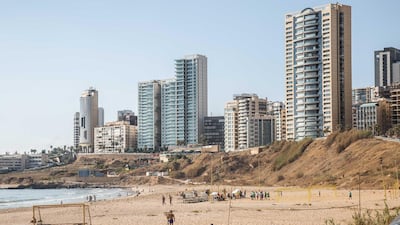Lebanon’s business conditions worsened to near a two-year low as political instability and cash flow issues took a toll on the private sector, according to a new survey.
Blominvest Bank’s Purchasing Managers Index fell to 45.4 in July from 46 in June, the weakest reading since October 2016, said the survey, sponsored by the lender and complied by IHS Markit.
A reading below 50 indicates contraction and above 50 signals expansion in the private sector economy.
“According to panellists, the uncertain political landscape, combined with cash flow issues, reportedly weighed on demand conditions in July,” said the lender’s report. “Survey data signalled the sharpest decline in new business for 21 months. Sales to international clients were also reduced, as instability at a broader regional level impacted foreign demand.”
_____________
Read more:
Lebanon's private sector growth at eight-month low in June
IMF hopeful of a new government, economic reforms in Lebanon
_____________
Lebanon, which is saddled with the Middle East and North African region's highest debt-to-GDP ratio of about 150 per cent, is struggling to boost growth and control its finances amid political wrangling over the formation of a new government and the hosting of over one million Syrian refugees.
Prime minister-designate Saad Hariri has been appointed to form a government following the May parliamentary elections - the first to be held since 2009 - and has emphasised the importance of proceeding with long-delayed economic reforms.
Lebanon’s debt-to-GDP ratio could balloon to 180 per cent by 2023 if the government does not undertake reforms to narrow its fiscal deficit, which may reach 10 per cent of GDP amid the current geopolitical tensions, the IMF said in February.
In April, donors from various countries pledged at the Cedre investment conference in Paris to provide Lebanon with over $11 billion in soft loans to mainly fund infrastructure projects. The pledges were linked to reforms, which include lowering the fiscal deficit by 1 percentage point annually over five years among other measures.
“Looking ahead, surveyed companies were largely pessimistic regarding future output prospects,” said the PMI report. “Panellists anticipate that political uncertainty will continue to impact business activity." The projections of weaker output coincided with another month of job shedding. Employment has fallen for five successive survey periods as businesses also pared back their purchasing activity in line with subdued demand, according to the survey.
The IMF estimates low economic growth of 1 to 1.5 per cent in 2018, with the main drivers of growth, real estate and construction, remaining subdued and a strong rebound is unlikely soon, it said in June.

